Kerry
Hello! I live in London, and I like reading about history, travel and literature. I also like good non-fiction about things I don't know about yet, and adventures.
Currently reading

This was really surprisingly lovely, and the second to last chapter made me cry on the Tube! It's a series of vignettes, which have a bit of a narrative but not really, about Jewett's summer living in a fishing village in coastal Maine with a herbalist/apothecary landlady. The point is basically that people are odd and wonderful. This sounds really boring but it is not boring.
 2
2
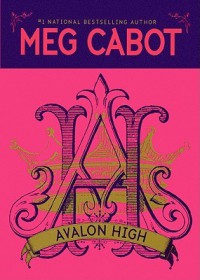
A fast and fun read, if a bit reactionary - the plot is based on the idea that society progresses thanks to the leadership of one great individual, with help from their small, elite social circle. But the characters are likeable, the story is engaging, the twists are surprisingly and satisfying, and it's a good plane read.
 2
2

I really like Msmarmitelover's blog, and thought her book would contain a lot of sensible things, which it which it does. She talks about the politics of food writing and is very unbullshitty and practical about things like photography (manual is good! ...but not if you're in a restaurant and taking >5min to get every shot) and making money (her advice is to have at least a part-time job, or to have your sister marry a future king). I'm still a bit taken aback by the fact that Pippa Middleton writes a Waitrose food column but Rodgers rightly points out that this is because food is a huge class signifier and that food writing, because it requires resources and access to restaurants and interesting ingredients, is a class signifier too.
Instead of saying "Do this and you'll be successful!!!" she lays out what the food writing scene looks like and why, and what to expect if you want to give it a try. That is, being encouraging without blowing smoke. Also, after an interviewee spent several hundred words talking about the good and bad parts of writing from William Leigh, AA Gill, 'Dan of Essex Eating' and 'Food Urchin', her next question was simply, "You only read men?", which was lovely.
 1
1
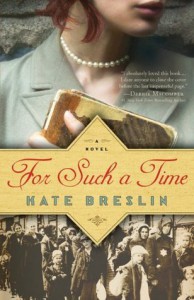
What I'm getting from the internet this week is that we desperately need a romance novel sequel to 'For Such A Time', about Nakam.
 1
1

"And that new chap, that Hitler. He's up to no good, I can tell you. He'll want watching, you mark my words."
"Nice cup of Rosie Lee?" my grandfather asked, using the Cockney tradition of rhyming slang.
This might not actually be a very good book, which is disappointing, because the title is SO, SO GOOD.
 3
3
 2
2
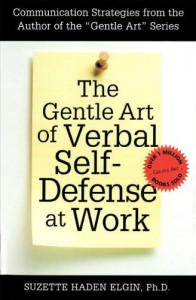
Or, 'How to deal with assholes when you work with them and can't just block them on Facebook and never think about them again, like you would every other asshole'.
Some of it was useful, but it was written in 2000, before office communication moved so much to email and IM. Discussions about meetings were good - like how to deal with two assholes are being assholes in different ways, at each other and at everyone else! - but overall the book was based on workplace norms that simply aren't norms any more. Not Elgin's fault, but also not super useful.
 1
1
Reading progress update: I've read 1 out of 308 pages.
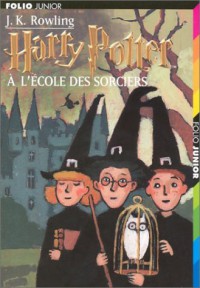
I have decided to practice French by reading the Harry Potter series en francais. I expect this to go very, very, very slowly.

I found this very useful in both my work, which is editing other people’s drafts, and my own writing. Some of it is a bit of psychological wank (Pinker is also a cognitive scientist), but there’s enough interesting, clear and useful stuff here that I’d recommend it for people who want to communicate well in writing.
This book was the object of an amusing fight between The New Yorker and The Economist, which I think the latter clearly won. Pinker’s point is basically that when you’re trying to communicate information, it’s best to write so it’s as easy as possible for people to understand you. There’s nothing valuable about being obscure and hard to comprehend; it just means you aren’t very good at communicating what you mean. The main idea I keep with me from this book are:
- If you can’t express what you mean in clear sentences, one reason may be that what you’re trying to say isn’t very clear. Go back and be precise about your thoughts as well as your words.
- Grammatical rules are there to make your sentences easier to follow. Ignore ones like ‘never end a sentence with a preposition’ or ‘avoid the passive voice’, which are mostly made up and can make sentences overly contorted. But pay attention to the difference between ‘its’ and ‘it’s’; mixing them up means your reader has to spend a second trying to work out what you mean, which is bad.
- For complex sentences, avoid splitting long clauses, and put the longest items in a list towards the end. This saves your reader from having to ‘carry’ parts of the sentence in their head, making it more likely they’ll lose track of what’s going on. A bad sentence is, “Areas that have bombed, mostly at night, by the coalition, led by Saudi Arabia, include Aden, the last major city yet to fall to the Houthi advance, border areas where the military is deployed, and the capital Sanaa.” A better version is: “The Saudi Arabia-led coalition has bombed the capital Sanaa, as well as border areas where the military is deployed and Aden, the last major city yet to fall to the Houthi advance. The bombings have mostly taken place at night.”
- Don’t write as if you’re explaining ‘down’ to someone stupider than you. Write for someone who is exactly as clever as you, but just happens not to know something you happen to know.
Pinker isn’t talking about novel writing or writing for any kind of artistic effect, but about what he calls ‘classic style’, including newspapers, blog posts and science writing. It’s helped me write better emails and identify problems with sentences that I knew were a little faffy but couldn’t quite figure out how to fix.
 2
2

Polly Coles spent a year living with her Italian husband and children in Venice, a place most people only visit for holidays. This isn’t a travel book about a romantic weekend, it’s about the difficulty of getting a washing machine delivered when the canals are at high water and there’s no lift in the building.
Coles gets increasingly frustrated with the surging crowds of tourists that block her way to the supermarket and her son’s school, and never seem to go away, no matter what time of year. She watches a centuries-old family hatmaker’s shop close to become a Chinese currency exchange – one of several within five minutes’ walk – and is pleased when a vaporetto (water bus) line opens for season ticket holders only, effectively shutting out visitors and allowing residents some space. (The line lasts for two years before the mayor opens it to tourists as well.)
Because nearly every foreigner in the city is a tourist, Coles, who is English, finds herself overperforming indicators of belonging. She only speaks Italian in public, feeling self-conscious about being audibly Anglo, and when her family goes on a day trip to the beach, she tries to hide their day bags when they’re on public transport. On the other hand, she is irked when tourists photograph her son and his friends playing and catching crabs in a canal.
What struck me most about this is that Coles is clearly not a usually grumpy person – she is warm and inviting to their neighbours, and briefly hurt when a young woman she knows can’t bring herself to use ‘tu’ with her. (Coles sees it as a sign of intimacy, then realises the teenager would find it incredibly rude to use the informal ‘you’ with an older woman.) She makes friends easily, once she starts to figure out the unspoken social rules that every community has, and enjoys striking up conversations with strangers. Her developing such a strong antipathy to tourists I think says much more about the unavoidable unpleasantness of living in a small place that gets tens of millions of visitors a year than anything about her character.
I’ve visited Venice twice and I think it’s lovely, but I absolutely agree that it feels more like a dedicated holiday spot than a place where people actually live. It’s wonderful and otherworldly to sleep and move around in a place with no motor vehicles at all, and the water in the canals is a shade of blue I’ve never seen anywhere else. Wandering through misty Venice in the morning is one of my favourite memories, but if I were trying to get my kid to school and then to work on time, I’d be pretty ticked off at all the dazed tourists too.
 3
3
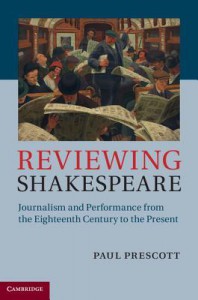
This was very up front about being written by a dude focusing on dudes. It spent most of the time talking about how (male) critics are envious of and want to replace male actors, focusing on Macbeths since the start of newspaper journalism. It spent quite a lot of time on George Bernard Shaw's sexual envy of Henry Irving over Ellen Terry, and whatever was going on with Kenneth Tynan's thing for Laurence Olivier. There was a bit of discussion near the end about blogs and popular reviewers, and a few hundred words about what it means when Michael Billington engages with readers in the comments of the Guardian site. I did not find it very useful as a text about Shakespeare criticism, although it was snappy and fun to read, which is a lot more than you can say for a lot of books by academics about their specialties. It was a bit reassuring as a text about male sexual envy, in the sense that a lot of people through history seem to have been really worked up about it but I don't really have to deal with it in my everyday life, except when I pick up books erroneously thinking they are going to be about Shakespeare criticism.
 2
2
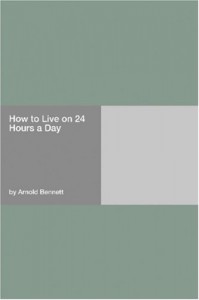
Short, extremely funny, makes me want to work at being a better person and gives practicable advice on how. And it's free. You have no excuse for not reading this over lunch.
 1
1

I GENUINELY CAN'T TELL IF THIS IS A GOOD OR A BAD BOOK BECAUSE IT'S A MODERN VERSION OF JANE EYRE AND THE MR. ROCHESTER CHARACTER IS BASED ON BRUCE SPRINGSTEEN. I ENJOYED IT A LOT. A+++++ WOULD WANK FURIOUSLY AGAIN.
 1
1
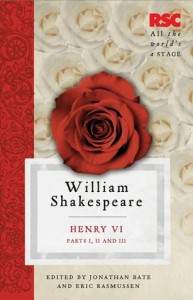
The Henry VIs are my favourite Shakespeare plays and this is a good edition of them from the RSC, with clear and conscious editorial choices - the RSC argues that the Folio, which reflects the choices of people who actually knew Shakespeare and worked in his company, is the closest to Shakespeare's versions of the plays as texts to read. A lot of free Shakespeares are based on a Victorian text that's a bit bowdlerised and not very thoughtfully edited, and the RSC has the resources and the will to make thoughtful editions.
The ancillary material is good, in the back, though I'm annoyed as ever by editors smooshing all three plays together but not giving three times the analytical space, as if they're automatically inferior plays because they go together, and not worth the pages. Even more annoyingly, a fair bit of that analytical space is taken up by Richard Gloucester/Richard III, who has his own damn play and people can talk about him there.
Still the RSC editions are probably my favourite modern editions of Shakespeare, except for their really dire Kindle formatting (I'm sure they have the resources to fix it, which makes it even more frustrating), but since I read this in print I'm happy with it.
 2
2
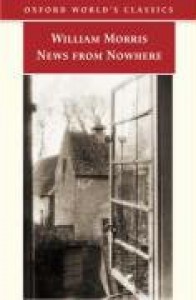
I heard "News from Nowhere" described as a socialist utopian romance, and while it's definitely all of those things it's also super dull and patronising. The main action so far has been the main character, William Guest (DO YOU SEE) wandering around Future London, which has been transformed into a chilled-out libertarian socialist paradise after a mysterious revolution, and saying things like "But how can you simply give this beautifully worked tobacco pouch to me? Surely I should pay you for it!" while all the other characters look curiously at him and go "Pay? What is this pay? Oh, yes, now I remember hearing tales of such things as 'payment' and 'money' being common at the end of the nineteenth century, but their meaning has been fair lost to history!" (I started playing a drinking game in my head for whenever a future character randomly referenced the end of the nineteenth century, but stopped when it happened three times on one page.)
Currently Our Hero has been sitting with a Future London character and having a long and stilted conversation on the theme of But Explain How This Utopian Paradise Works for thirty-four pages, punctuated every so often by Our Hero going, "But wait, how can this be? Isn't commerce necessary for a society to progress?" and Future Londoner going, "Yes, this was indeed the folly of many people at the end of the nineteenth century! Fortunately we have moved past that, as I shall now explain!"
It's dull when Ayn Rand does it and it's still dull when a socialist does it, and the gender politics are terrrrrrrible. I'm quitting.
2015: The Year of Reading No White Guy Books
I'm tossing around the idea of aiming to not read any books written by white men in 2015, and the more I think about it, the more the reasons I'm coming up with for not doing so aren't good enough to not do it.
Reason 1: A lot of non-fiction on topics I like is written by white men, esp. early modern European history.
Answer 1: This is exactly why I should do it. If I want to read non-fiction about those topics I'll seek out books by women and people of colour, which is Good.
(Reason 1b: I also thought "oh, but non-fiction on topics I like by non-white-men may be more difficult to find and expensive", but then realised...
Answer 1b: ...that's probably unexamined bias and not even true, and if it is true, is even more of a reason to consciously seek them out.)
Reason 2: I have a pile of books by various authors on my immediate to-read list (of 10-12 books), some of whom are white men.
Answer 2: A year is a good motivational period of reading/not reading things so I should definitely stick to that, and I have two months to clear all the white guy books I really desperately want to read. This will also prompt me to figure out which white guy books I really desperately want to read, and if I can't get to it in two months I probably didn't actually really desperately want to read it.
Reason 3: This really really amazing book has come out about all your favourite things and OH NO it's written by a white guy!
Answer 3: If it's that amazing it will still be amazing in 2016 and I'll read it then.
What makes an author 'white' and 'male' are obviously not uncomplicated, but since it's for my own decision-making I feel okay defining it as 'someone who looks like a dudebro' ie not excluding American Latino men, or people whose gender identities include maleness but are not only male.
I'm not looking for book recs (at least, not more than I always am!), it's more a commitment to myself that when I go "hmm, I want to read that book!" and that book is written by a white guy, I will not read that book and instead read another book.
 1
1











 1
1